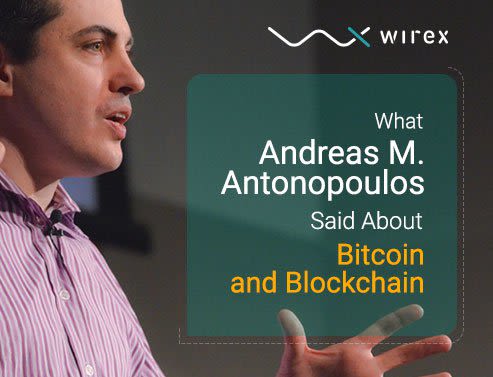What Andreas Antonopoulos said about Bitcoin and Blockchain
Mar 6, 2017 published by Wirex Team On 22 February 2017, we had the opportunity to see Andreas Antonopoulos - the popular Bitcoin evangelist and author of Mastering Bitcoin and The Internet of Money - in action. He was on a South-East Asia tour and made a stop in Kuala Lumpur, Malaysia to speak about bitcoin, blockchain, and cryptocurrencies.
The event, A Day with Andreas: Discover, Engage and Connect to the Future of Blockchain and Cryptocurrency was co-organised by Bloktex and MIGHT. Heres what Andreas said on the day.
Bitcoin is the natural evolution of money
Andreas explained that the shift and acceptance of digital currencies are part of the natural evolution of money. With most of fiat money in circulation existing digitally, we are no strangers to the concept of money in digital format. The push for cashless societies in some countries also helps to accelerate digitisation of money itself. Based on the rise of digital wallets and online banking accounts, abstract forms of money is not only accepted, it is expected.
Traditional financial institutions fail to address problems brought with the Information Age, said Andreas on how bitcoin fills in the gap caused by this shift, We no longer live in the Industrial Age, we live in the Information Age.
Blockchain replaces trust by third parties
When one goes to the grocery store and buys a banana (Andreas seemed to enjoy using bananas as an example), they usually use one of two options: cash or debit/credit cards.
On its own, paper and plastic doesnt hold much value. The merchant trusts that they hold value because they trust the government and the payment processor (Visa or MasterCard).
Blockchain - timestamped data recording payment information of said purchase - is a system where government or payment processors are not required to establish trust between buyer and merchant. Its nature is static, non-editable and non-erasable (in practice). This makes the cryptocurrency ledgers suitable to act as proof of payment and proof of transaction. Trust is transferred from third parties to networks maintained by thousands of computers around the world.
Everyone can use bitcoins
Andreas explained at length about bitcoins accessibility, even to demographics not supported by traditional financial institutions. Where you are, what nationality you are, what gender you are, it doesnt matter, he said.
As bitcoin and cryptocurrencies mature, so does its regulations, so this is not true in some countries where self-regulation is becoming the norm. It is hard to acquire bitcoin without personal information - making bitcoin redundant as an anonymous payment method.
The difference between IPOs and ICOs
IPOs (Initial Public Offerings) and ICOs (Initial Coin Offerings) share only two things in common, said Andreas, I and O.
ICOs have radically changed how startups can being funded, removing geographical barriers from interested investors. Startups can make their own cryptocurrency and allow the public to buy them, thus raising capital. While some startups will fail (and deplete investors money along the way), we may see some startups without access to traditional funding methods flourish as well. We may see ICOs as the ultimate crowdfunding method in the future, bypassing Kickstarter and similar services.
Cryptocurrencies will not affect fiat currencies - it compliments it
There are more than 190 government-issued fiat currencies globally. There are more than 4000 cryptocurrencies around. Can they exist together? Yes, said Andreas.
Cryptocurrencies can have different purposes, and can act as means of self-expression - something that fiat currencies are unable to do. For example, a singer created her own cryptocurrency and uses it to reward fans. Another comparable example is cryptocurrency being used as public voting system, as we can see in Steem.
In fact, everyone here can issue their own cryptocurrencies, but the value is only as good as what people are willing to trade for it, said Andreas.
Non-human ownership of bitcoin and cryptocurrencies are possible
For the first time in history, we can see non-human entities owning and controlling bitcoin wallets and accounts automatically. Like bots, it will act as it was programmed, even without human intervention. This has many implications - both good and bad.
For example, bots can automatically use data analytic to predict natural disasters, and operate a donation drive in advance for its victims. On the flip side, it can also be programmed to be a ransomware, automatically hiring and paying programmers to improve its code for bigger destruction.
Like many other tools, it amplifies the makers intention. The takeaway from this section is clear: programmes and codes should be used for good to benefit humanity.
Conclusion
Bitcoin is a young currency - it is not even a decade old. Much prediction has been made about it. Only time will uncover the myriad of use cases possible from bitcoin, blockchain and cryptocurrency technology and usage. Judging from the fast adoption rate, and the high number of new users using Wirex platform, we believe that the future is bright for this new technology.
